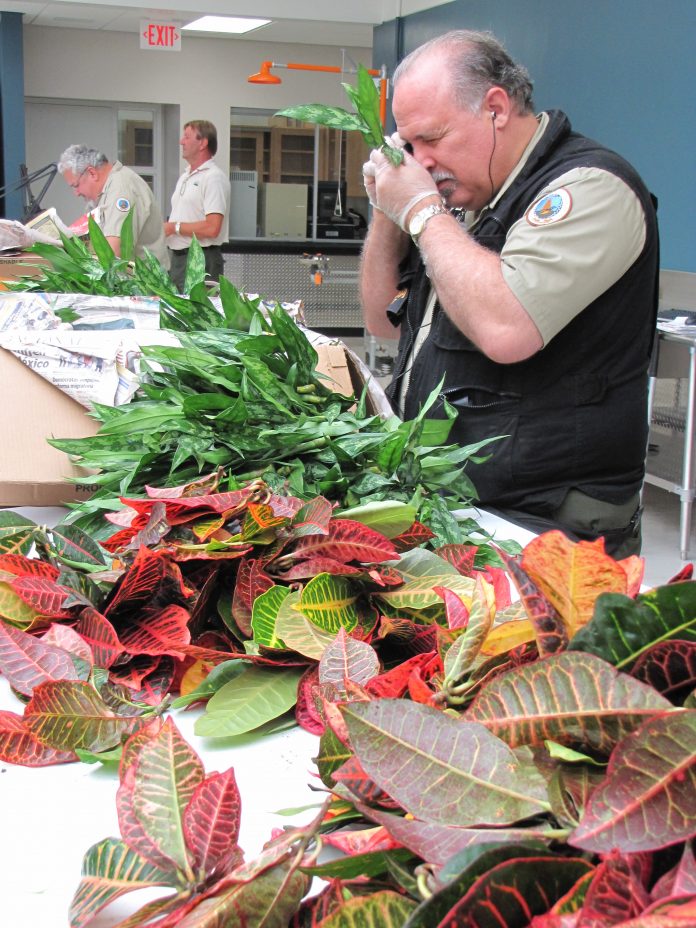Greg Rosenthal of the U.S. Department of Agriculture’s (USDA) Animal and Plant Health Inspection Service explains how right-sizing regulation can optimise plant protection
The idea of right-sizing regulation is a guiding force for USDA’s Animal and Plant Health Inspection Service (APHIS). Part of our mission is safeguarding U.S agriculture and natural resources against invasive pests and diseases and facilitating the safe trade of agricultural products. The scale and complexity of this work is vast. In 2017, APHIS helped safeguard more than $98 billion worth of U.S. agriculture production and facilitate agricultural exports valued at over $138 billion.
The role of regulations
APHIS’ regulations are a crucial tool for mission success. Our regulations prevent devastating foreign pests and diseases from entering the United States on imported agricultural products. Should a pest or disease enter our country, regulations or other regulatory means allow us to take decisive action to prevent its spread.
The balance: most effective, least restrictive
Of course, there is another side to regulations. Some regulatory actions can create burdens on producers and the industries they supply. That is why we constantly seek the most effective – and least restrictive – approach possible.
To make sure we are hitting the mark, APHIS officials meet yearly with representatives from various commodity sectors to discuss the opportunities and challenges they face. We also reduce burdens by constantly applying cutting-edge science, technology and data analysis to streamline inspection methods, commodity treatments, pest detection, pest management and export certification. In addition, APHIS uses existing regulatory flexibilities and non-regulatory solutions to right-size regulation.
 Regulatory flexibility
Regulatory flexibility
The status of plant and animal pest and disease conditions worldwide constantly changes and import requirements must keep up. That can be challenging, however, when each change requires a time-consuming rulemaking process. To respond faster, APHIS has begun moving specific import requirements for certain commodities out of the Code of Federal Regulations (CFR) and into online regulatory manuals. More general import requirements remain in the CFR and the CFR refers to the manuals for specific requirements. That allows us to change these requirements when needed through a much faster notice-based process, which includes a public comment period.
Non-regulatory solutions
We are eager to look beyond rulemaking to solve plant and animal health problems through other means whenever possible, using solid science and industry best practices. In 2016, we used this approach when we confirmed that bacterial leaf streak, a disease affecting corn plant leaves, was present in several states throughout the U.S. Corn Belt. We knew that regulating the disease would be neither practical nor possible.
Instead, APHIS worked with our partners to identify best management practices to effectively control the disease. At the same time, APHIS gathered scientific evidence on this little-known pathogen to help build a strong case for the safety of U.S. corn, protecting $6.3 billion in U.S. corn exports from trade disruption.
We also collaborate with industry, states, academia and others to promote voluntary programmes that protect U.S. agriculture. For example, APHIS and the seed industry are developing a Seed Health Regulatory Framework. It will make international seed movement safer by promoting the worldwide use of consistent and equivalent requirements that reduce pest risk.
Through our Offshore Certification Programs, we verify that overseas nurseries and other facilities that export large-volume, high-demand plants, cuttings, seeds and other products to the United States meet minimum production and sanitation standards. This offshore work is an effective way to prevent harmful plant pests and diseases from entering our country.
Everyone wins
APHIS constantly strikes that critical balance of taking the most effective and least restrictive approach. This allows us to regulate at the speed of commerce and relieve industry burdens wherever possible – without compromising our mission.
Greg Rosenthal
Communications Specialist
United States Department of Agriculture (USDA)
Animal and Plant Health Inspection Service
Twitter: @USDA











